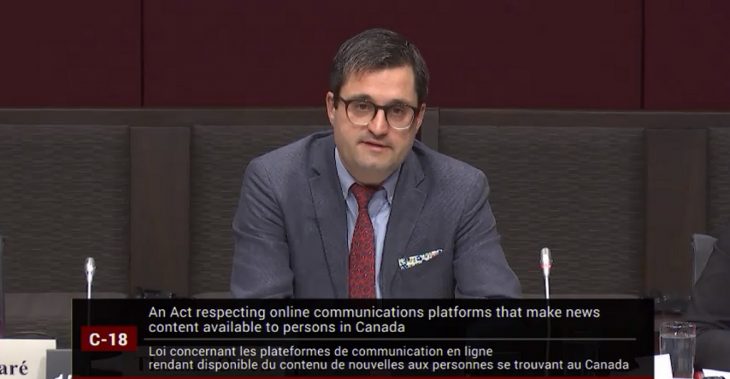
By Christopher Guly
OTTAWA – Should Bill C-18 not pass Parliament, “there is no guarantee that the deals and the agreements that have been currently negotiated in the Canadian context would continue, because there is no obligation on platforms to continue to bargain in that way,” Thomas Owen Ripley, associate assistant deputy minister for cultural affairs at the Department of Canadian Heritage, said at a Tuesday hearing of the Standing Senate Committee on Transport and Communications studying the Online News Act.
“Over time, it would be perfectly open for platforms to stop entering into those agreements with Canadian news businesses.”
C-18, which passed second reading in the Senate on April 18, would require internet platforms to compensate news businesses for linking to their content.
If the bill is granted royal assent and becomes law, “there would be a sustained obligation on platforms to continually have agreements in place with news businesses,” said Ripley.
He explained that without the Online News Act, “there would be no public-interest framework” guiding agreements already in place.
“The core objective of the bill is to put in place that obligation on platforms to negotiate [and] secure a revenue stream for news businesses,” said Ripley, who added that the proposed law is intended to address the “continued erosion of the Canadian news marketplace.”
He also noted that section 27 of C-18 provides eligibility for non-Canadian media organizations operating in Canada, which employ two or more journalists and provide, as the legislation states, “coverage of democratic institutions and processes” – such as The New York Times, as Ripley offered.
“This is in part our response to our trade obligations and making sure that we’re putting in place a nondiscriminatory framework,” he said.
However, Konrad von Finckenstein, former chairman and CEO of the CRTC, said he does not support “the underlying concept of the bill at all.”
But since the bill is under consideration by the Senate committee, he offered some suggestions to improve it.
“Who are [digital news intermediaries]? The Act doesn’t define them,” said von Finckenstein, as one example.
“I would say something like having revenue annually of at least $70 million or one million users, or something like that – but you need objective criteria.”
Under C-18, the CRTC would oversee deals between such platforms as Google and Facebook, and news organizations – and that will be “quite a challenge,” said von Finckenstein, a former Federal Court judge and past commissioner at the Competition Bureau.
“It’s not an area in which they normally deal,” he explained. “It’s not in the nature of the CRTC to supervise. They usually make decisions.”
The commission will also have to deal with administering regulations under Bill C-11 – the Online Streaming Act – that is nearing the final lap in the Senate, von Finckenstein added.
When asked by Independent Saskatchewan Senator Pamela Wallin, a former television broadcaster, whether the CRTC has “the expertise to do these two new massive jobs and anywhere close to the infrastructure and the bodies to do it,” the commission’s former chair said the CRTC will “have to set up a new division to deal with C-18 and bring in the necessary expertise.”
“They will probably also contract out a lot of it – like, for instance, the code of conduct,” said von Finckenstein, who also noted that “it would have been helpful” if C-18 had outlined some “structural changes” to the CRTC to assist it with regulating the bill’s implementation.
“This won’t be done overnight,” offered Von Finckenstein. “It will take a long time to implement.”
Last Thursday, Google’s senior executives appeared before the House of Commons Standing Committee on Canadian Heritage on C-18 in which they pitched a fund to which the search-engine giant “would contribute, but that would be independently governed.”
“Proceeds from this fund would be distributed consistent with clear criteria, governed by an independent board of experts, in line with the approach already adopted by Canada through its journalism [labour] tax credit,” said Kent Walker, president of global affairs and chief legal officer of Google and its parent company, Alphabet Inc.
Screenshot of Thomas Owen Ripley, associate assistant deputy minister for cultural affairs at the Department of Canadian Heritage.


